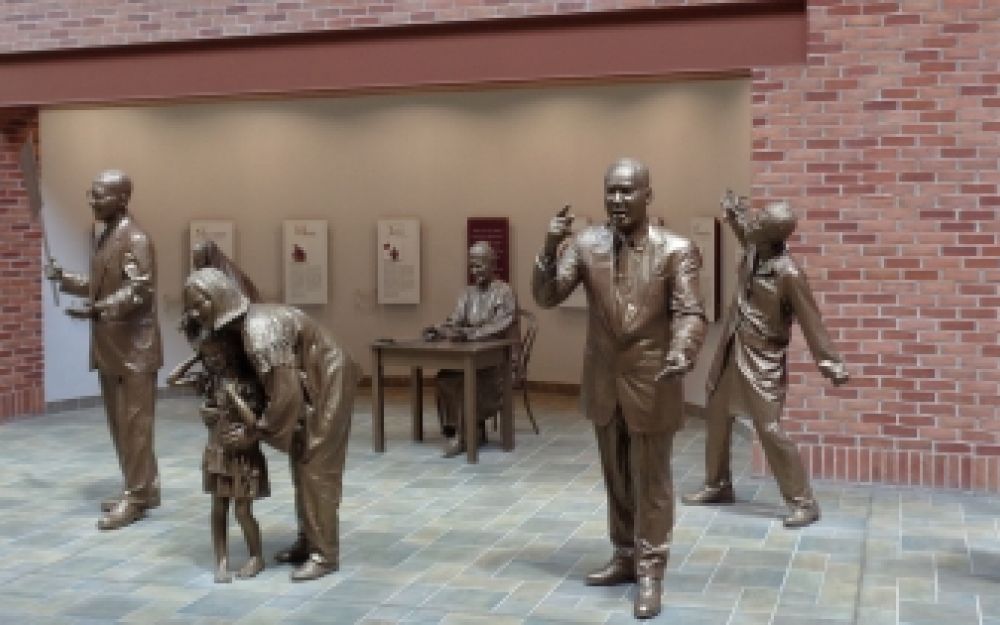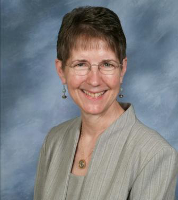
The Solanus Casey Center in Detroit (the Capuchin Province of St. Joseph monastery) has a group of statues that welcome you when you come in; they represent persons who lived the Gospel. (Courtesy of the Solanus Casey Center)
Alone or with a friend, reflect back on:
-
Challenging personal situations that you encountered this year
-
Challenges that your school or community faced
-
National and global conflicts and crises
This story includes profiles of several people who made the world a better place, as well as links to information about them. Do they remind you of anyone in your life, or famous people in today’s news?
Ending the year with gratitude
This Advent I had the privilege of designing and leading a retreat day for one of our downtown parishes. The theme was "Living the Incarnation Today: the Union of the Human and the Divine." The parishioners and others who joined us made me proud that I am a Catholic. Their diversity spoke to who we are as a church and as a country — men, women, gay, straight, single, married, religious, lay, young, old, black, white, professional, working class. Some were immigrants; others were recovering from addiction; many were retired; some were employed and others unemployed. A microcosm of the mystical body of Christ. A microcosm of our nation.
We shared how we understand Incarnation and the incredible mystery that divinity embraced humanity and that we have this divine energy, God, dwelling within us. We practiced contemplation as a significant way to deepen our interior journey so that we can know our authentic self, the self that rests in the divine embrace.
With that deepening awareness of who we really are, contemplation takes us inward in order to go outward, enabling us to move forward together. We ended our day with how we will continue to live the Incarnation in our daily lives.
I felt so grateful for this day, for all who were gathered. This year was filled with so much sadness and so many tragedies in our church, in our nation and in our world that gratefulness seems in short supply.
And yet … I realized there is much to be grateful for, men and women who have lived the Incarnation in ways that give us hope and that have been transformational. Some of them greeted me at the center where we were meeting. The Solanus Casey Center in Detroit (the Capuchin Province of St. Joseph monastery) has a group of statues that welcome you when you come in; they represent persons who lived the Gospel. Some may be more familiar to you than others, but they all lived out of that authentic self; they all lived out of Christ consciousness; they all had "put on the mind of Christ."
I offer this meditation adapted from this Franciscan expression of the Beatitudes written by Capuchin Br. John Francis Samsa, "The Beatitudes of Christ: Embrace the Challenge." I encourage you to take some time as the old year ends and reflect on these lives as well as others for whom you are grateful. Reflect on those people or situations that gratuitously offer you hope and whose lives made our world a better place.
Blessed are the poor in spirit. Theirs is the reign of God. Dorothy Day — a Catholic with communist ideals; preached socialism and women's rights; pacifist; journalist challenging church and government policies.
Blessed are the non-violent. They will possess the Earth. Takashi Nagai — exposed to radiation from the bomb that fell on Nagasaki; preached forgiveness and reconciliation until his death; amid the destruction he spoke only of the love of Christ; spoke of disarmament as moral obligation.
Blessed are those who mourn. They will be comforted. Jean Donovan — fun loving; loyal Republican; engaged to be married; Ursuline volunteer in El Salvador; murdered for distributing clothes and food to those most in need in that war-torn country.
Blessed are those who hunger and thirst for justice. They will be satisfied. Msgr. Clement Kern — Catholic priest; conscience of Detroit; opened his church to alcoholics, illegal immigrants, gays and social protesters; supported labor unions and lived Catholic social teaching.
Blessed are the merciful. They will receive mercy. Mother Teresa — fed, clothed, cleaned and comforted the sick and dying on the streets of Calcutta (Kolkata); founded a religious community dedicated to this same work.
Blessed are the pure of heart. They will see God. Catherine de Hueck — pioneer among North American Catholic laity in implementing social doctrine; insisted that action be rooted in prayer; advocated making faith an integral part of ordinary life; bridged Eastern and Western Christian traditions.
Blessed are the peacemakers. They will be called children of God. Martin Luther King — rooted in faith, gave hope to oppressed people; saw achieving racial equality as a duty for each person; courage to stand undefended when attacked; jailed and beaten; advocated non-violent strategies in opposing injustices.
Blessed are those who suffer persecution for justice's sake. Theirs is the reign of heaven. Bishop Óscar Romero — priest of El Salvador; allowed himself to experience the suffering of his people and the indifference of the political leaders; spoke of a revolution of conscience, of love and justice; shot down while presiding at the Eucharist.
As this year draws to a close, let us be grateful for all those who live the Gospel. May the new year invite us to go ever deeper, encountering the divine within so that we have the courage to act out of our authentic selves. May your new year be filled with gratitude, love and outrageous acts of courage. Happy New Year!
Consider one of the eight Beatitudes listed in this article. With a classmate, discuss two things you can do to live out that Beatitude in your own life.
During Advent, we often hear this Gospel story, in which Jesus offers clear clues that he’s fulfilling the mission of the Messiah by serving those most in need of hope.
When John the Baptist heard in prison of the works of the Christ,
he sent his disciples to Jesus with this question,
"Are you the one who is to come,
or should we look for another?"
Jesus said to them in reply,
"Go and tell John what you hear and see:
the blind regain their sight,
the lame walk,
lepers are cleansed,
the deaf hear,
the dead are raised,
and the poor have the good news proclaimed to them.
And blessed is the one who takes no offense at me."
Similar to the Beatitudes, this statement affirms that Jesus came to help people who are vulnerable and live on the margins of society.
Alone or with a partner, consider:
- If you lived when Jesus said these words, would you have found them hopeful or disturbing? Why?
- Who in today's world might find the Beatitudes or this passage from Matthew to be disturbing?
- Identify someone who’s working today to lift up poor or vulnerable people and describe how they do this.
Pope Francis has said "How I would like a church that is poor and for the poor!" This reflects what's called the church's preferential option for poor and vulnerable people. Here's how the U.S. Catholic Bishops explain this:
"The primary purpose of this special commitment to the poor is to enable them to become active participants in the life of society. It is to enable all persons to share in and contribute to the common good. The 'option for the poor,' therefore, is not an adversarial slogan that pits one group or class against another. Rather it states that the deprivation and powerlessness of the poor wounds the whole community. The extent of their suffering is a measure of how far we are from being a true community of persons. These wounds will be healed only by greater solidarity with the poor and among the poor themselves."
Economic Justice for All, No. 88, United States Conference of Catholic Bishops, 1986
Alone or with a partner, discuss:
- By working in solidarity with poor people, how is the church helping all people?
- As Christmas nears, we see more efforts to collect food, money and toys for people living in poverty. Why can’t we feel satisfied with giving poor and vulnerable people the things they need?
- What’s one thing you can do to empower a poor or vulnerable person to improve their condition and be part of your community?
Sisters do many things to remain spiritually strong. This includes participating in regular spiritual retreats, in which they take time away from their normal routine to focus on their relationship with God. Many sisters, including Sr. Nancy Sylvester, the author of this article, lead retreats as part of their ministry. Seek out an Advent retreat opportunity in your area, or consider using this online retreat resource to reflect on scripture and Advent traditions throughout this sacred season.
Learn more about the needs of people living in the web of poverty by watching this brief video. Then explore ways that you can support the Catholic Campaign for Human Development in its work to empower people to be active participants in efforts for affordable housing, living wages, better educational opportunities and more.
You came to us, Jesus, poor and vulnerable,
a baby born to a family that had many needs, much to worry about.
That didn’t make much sense at the time.
You grew up to live without a home, roaming with friends, relying on strangers.
And you taught about how it’s a blessing to be poor, a blessing to be poor in spirit.
That didn’t make much sense at the time.
Help us, Jesus, to make sense in our times.
Help us to be beatitude people, to become blessings —
this Advent and always — to the people you loved so very much.
Amen.
Tell us what you think about this resource, or give us ideas for other resources you'd like to see, by contacting us at [email protected]
